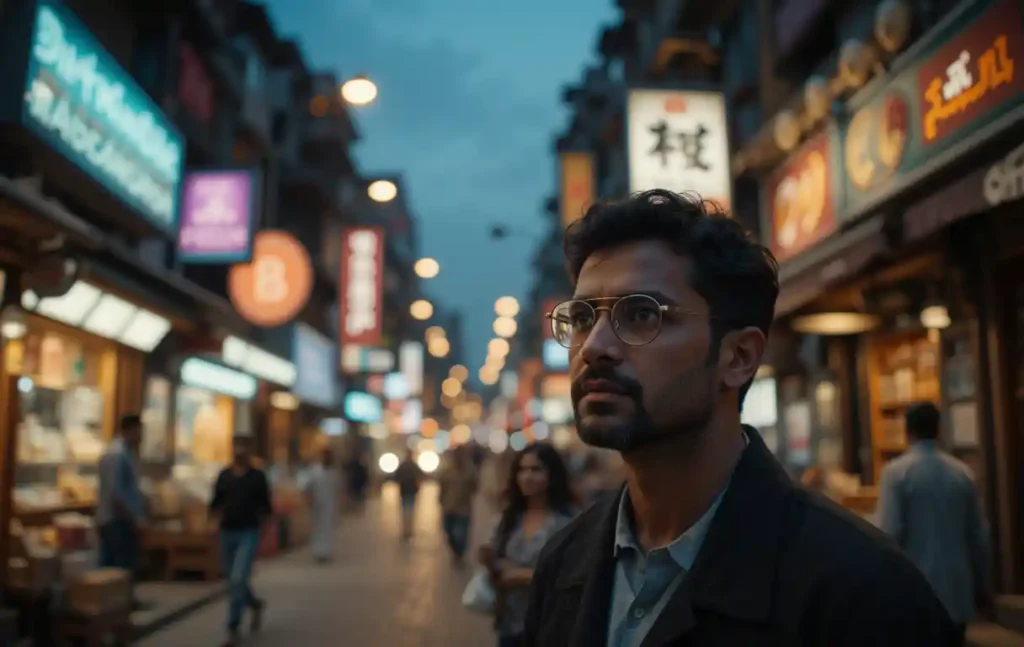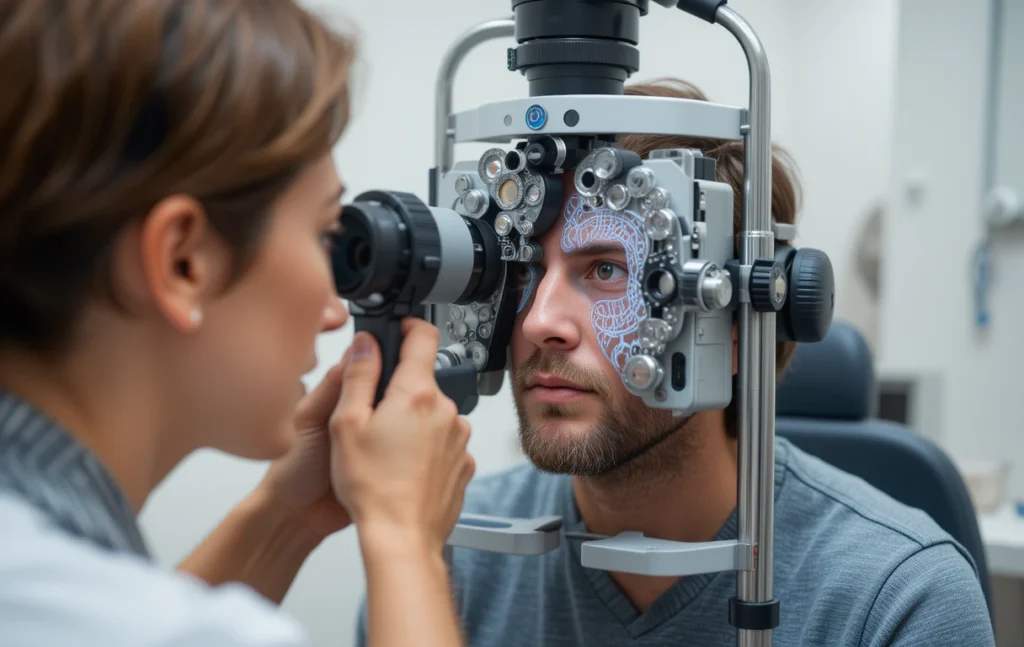
Imagine navigating a bustling Lahore street at dusk, unable to see shop signs or avoid obstacles in the dim light. For over 1.8 million Pakistanis with glaucoma, this is a daily reality. Glaucoma, a silent eye disease, doesn’t just steal peripheral vision—it dims your ability to see at night. This article answers why glaucoma affects night vision, explores its causes, early warning signs of glaucoma at night, and offers practical solutions for low light vision loss glaucoma to help Pakistanis protect their sight.
Understanding Glaucoma and Its Impact in Pakistan
Glaucoma is a group of eye conditions causing glaucoma optic nerve damage due to elevated eye pressure glaucoma. The optic nerve carries visual signals to the brain, and its damage results in vision loss glaucoma, often starting with peripheral vision loss. In Pakistan, glaucoma is a growing concern, with a 2019 study projecting an increasing burden by 2025, especially among those over 60. The Pakistan National Blindness Survey found glaucoma accounts for 7.1% of blindness, with rates as high as 39% in Balochistan.
Why Does Glaucoma Worsen Night Vision?
The question why is night vision worse with glaucoma lies in the optic nerve’s role in low-light vision. Glaucoma damages nerve fibers, impairing the retina’s rod cells, which are crucial for seeing in dim conditions. This leads to poor night vision causes like glaucoma and trouble seeing in low light. A 2025 South Asia study estimates primary open-angle glaucoma (POAG) prevalence at 1.6% in the region, noting its impact on low-light vision, particularly in older males.
In Pakistan, limited healthcare access worsens these challenges. A 2024 study reported a 0.35% increase in glaucoma-related disability among Pakistani males from 1990–2019, driven by inadequate screening and treatment.
Early Signs of Glaucoma at Night in Pakistan
Spotting early signs of glaucoma at night is critical, as 90% of Pakistanis remain unaware of the disease. Watch for these warning signs of glaucoma vision loss:
- Difficulty adapting to dim light: Struggling to see when entering a dark room or walking at dusk in Karachi.
- Halos around lights: Seeing rings around streetlights or headlights, common in urban areas.
- Trouble navigating low light: Bumping into objects at night due to peripheral vision loss.
- Glare sensitivity: Discomfort from bright lights, impacting nighttime driving with glaucoma vision.
These glaucoma symptoms in low light are vital to recognize, as nearly half of Pakistan’s 1.8 million glaucoma patients lose vision due to delayed diagnosis.
Glaucoma Statistics in Pakistan
Key statistics underscore glaucoma’s impact in Pakistan:
| Source | Statistic | Year |
|---|---|---|
| GBD 2017 Study | Glaucoma prevalence rising, especially in 60+ age group | 2019 |
| Pakistan Blindness Survey | Glaucoma causes 7.1% of blindness, 39% in Balochistan | 2007 |
| Molecular Basis Study | 1.8 million glaucoma patients, 90% unaware | 2017 |
| Belt and Road Study | 0.35% increase in glaucoma YLDs in males | 2024 |
Additional Insights
- South Asia’s glaucoma prevalence is 2.1%, with POAG at 1.6% (South Asia Study, 2025).
- Rural Pakistan faces higher blindness rates due to limited eye care access.
- By 2025, the eye disease burden, including glaucoma, will rise (GBD 2017).
How Glaucoma Damages Night Vision
The causes of poor night vision in glaucoma stem from optic nerve deterioration. Elevated intraocular pressure reduces blood flow to the nerve, impairing its ability to process low-light signals. This results in night blindness glaucoma and glaucoma and difficulty seeing at night. In Pakistan, low awareness delays glaucoma diagnosis, worsening low light vision issues.
Tips to Manage Night Vision Loss in Pakistan
Adapting to glaucoma night vision problems and solutions enhances safety and independence. Here are tips to manage glaucoma night vision loss for Pakistanis:
- Improve home lighting: Use bright LED bulbs, even in rural areas with unstable electricity.
- Wear anti-glare glasses: Yellow-tinted glasses reduce glare from headlights, aiding managing nighttime driving with glaucoma.
- Plan daytime activities: Avoid nighttime errands to minimize glaucoma symptoms nighttime.
- Use smartphone tools: High-contrast apps or voice navigation assist in dim settings, accessible in cities like Peshawar.
- Prioritize eye checkups: Visit urban eye clinics for glaucoma treatment options.
These best ways to improve night vision glaucoma reduce risks in Pakistan’s challenging infrastructure.
When to Consult an Eye Doctor in Pakistan
Knowing when to see an eye doctor for glaucoma is essential. Seek care if you notice signs of glaucoma affecting night vision early, such as halos, glare, or low-light difficulties. With 7.1% of blindness linked to glaucoma, early intervention is critical. Eye doctors may use tonometry or visual field tests to detect visual field loss. Visit facilities like Al-Shifa Trust Eye Hospital in Rawalpindi or LRBT Eye Hospital in Karachi.
Solutions for Night Vision Loss
Medical solutions for low light vision loss glaucoma include:
- Eye drops: Lower intraocular pressure to reduce glaucoma optic nerve damage.
- Laser therapy: Available in urban centers to improve fluid drainage.
- Surgery: Trabeculectomy for advanced cases, though rural access is limited.
Combining these with lifestyle changes addresses how to improve night vision with glaucoma.
FAQs About Glaucoma and Night Vision in Pakistan
Q: Why does glaucoma cause night vision problems?
A: Glaucoma damages the optic nerve, impairing low-light signal processing, leading to glaucoma and poor nighttime vision.
Q: What are early signs of glaucoma at night in Pakistan?
A: Halos around lights, difficulty adapting to dim light, or trouble navigating at dusk, common in cities like Islamabad.
Q: How can I manage night vision loss from glaucoma?
A: Use bright lighting, anti-glare glasses, and avoid nighttime travel. Regular eye checkups are crucial.
Q: Where can I get glaucoma treatment in Pakistan?
A: Visit eye hospitals like Al-Shifa Trust in Rawalpindi or LRBT in Karachi. Rural patients may need to travel.
Q: Is glaucoma common in Pakistan?
A: Yes, over 1.8 million Pakistanis have glaucoma, with rising prevalence.
Take Action to Protect Your Vision Today
Glaucoma’s impact on night vision is a pressing issue in Pakistan, where 90% of cases go undiagnosed. Don’t let the silent thief of sight steal your independence. Schedule an eye checkup now at a trusted eye hospital like Al-Shifa Trust or LRBT to detect glaucoma early and safeguard your night vision. Act today—your vision depends on it.
Disclaimer
This article is for informational purposes only and does not constitute medical advice. Consult a qualified eye doctor in Pakistan for diagnosis and treatment of glaucoma or night vision issues. Information is accurate as of June 25, 2025, but medical guidelines may change.


